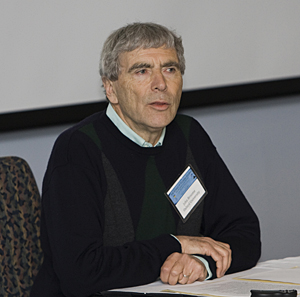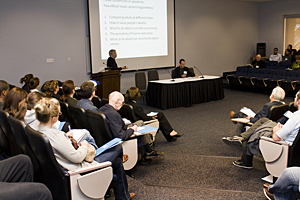
ADVERTISEMENT
- Rozovsky wins prestigious NSF Early Career Award
- UD students meet alumni, experience 'closing bell' at NYSE
- Newark Police seek assistance in identifying suspects in robbery
- Rivlin says bipartisan budget action, stronger budget rules key to reversing debt
- Stink bugs shouldn't pose problem until late summer
- Gao to honor Placido Domingo in Washington performance
- Adopt-A-Highway project keeps Lewes road clean
- WVUD's Radiothon fundraiser runs April 1-10
- W.D. Snodgrass Symposium to honor Pulitzer winner
- New guide helps cancer patients manage symptoms
- UD in the News, March 25, 2011
- For the Record, March 25, 2011
- Public opinion expert discusses world views of U.S. in Global Agenda series
- Congressional delegation, dean laud Center for Community Research and Service program
- Center for Political Communication sets symposium on politics, entertainment
- Students work to raise funds, awareness of domestic violence
- Equestrian team wins regional championship in Western riding
- Markell, Harker stress importance of agriculture to Delaware's economy
- Carol A. Ammon MBA Case Competition winners announced
- Prof presents blood-clotting studies at Gordon Research Conference
- Sexual Assault Awareness Month events, programs announced
- Stay connected with Sea Grant, CEOE e-newsletter
- A message to UD regarding the tragedy in Japan
- More News >>
- March 31-May 14: REP stages Neil Simon's 'The Good Doctor'
- April 2: Newark plans annual 'wine and dine'
- April 5: Expert perspective on U.S. health care
- April 5: Comedian Ace Guillen to visit Scrounge
- April 6, May 4: School of Nursing sponsors research lecture series
- April 6-May 4: Confucius Institute presents Chinese Film Series on Wednesdays
- April 6: IPCC's Pachauri to discuss sustainable development in DENIN Dialogue Series
- April 7: 'WVUDstock' radiothon concert announced
- April 8: English Language Institute presents 'Arts in Translation'
- April 9: Green and Healthy Living Expo planned at The Bob
- April 9: Center for Political Communication to host Onion editor
- April 10: Alumni Easter Egg-stravaganza planned
- April 11: CDS session to focus on visual assistive technologies
- April 12: T.J. Stiles to speak at UDLA annual dinner
- April 15, 16: Annual UD push lawnmower tune-up scheduled
- April 15, 16: Master Players series presents iMusic 4, China Magpie
- April 15, 16: Delaware Symphony, UD chorus to perform Mahler work
- April 18: Former NFL Coach Bill Cowher featured in UD Speaks
- April 21-24: Sesame Street Live brings Elmo and friends to The Bob
- April 30: Save the date for Ag Day 2011 at UD
- April 30: Symposium to consider 'Frontiers at the Chemistry-Biology Interface'
- April 30-May 1: Relay for Life set at Delaware Field House
- May 4: Delaware Membrane Protein Symposium announced
- May 5: Northwestern University's Leon Keer to deliver Kerr lecture
- May 7: Women's volleyball team to host second annual Spring Fling
- Through May 3: SPPA announces speakers for 10th annual lecture series
- Through May 4: Global Agenda sees U.S. through others' eyes; World Bank president to speak
- Through May 4: 'Research on Race, Ethnicity, Culture' topic of series
- Through May 9: Black American Studies announces lecture series
- Through May 11: 'Challenges in Jewish Culture' lecture series announced
- Through May 11: Area Studies research featured in speaker series
- Through June 5: 'Andy Warhol: Behind the Camera' on view in Old College Gallery
- Through July 15: 'Bodyscapes' on view at Mechanical Hall Gallery
- More What's Happening >>
- UD calendar >>
- Middle States evaluation team on campus April 5
- Phipps named HR Liaison of the Quarter
- Senior wins iPad for participating in assessment study
- April 19: Procurement Services schedules information sessions
- UD Bookstore announces spring break hours
- HealthyU Wellness Program encourages employees to 'Step into Spring'
- April 8-29: Faculty roundtable series considers student engagement
- GRE is changing; learn more at April 15 info session
- April 30: UD Evening with Blue Rocks set for employees
- Morris Library to be open 24/7 during final exams
- More Campus FYI >>
12:15 p.m., Nov. 3, 2009----Climate scientists, philosophers, economists, ethicists and students gathered at the University of Delaware's Clayton Hall on Friday, Oct. 30 and Saturday, Oct. 31 to discuss the ways in which humans should respond to climate change, as part of a conference titled, "The Ethics of Climate Change: Intergenerational Justice and the Global Challenge."
An audience of 100 listened to John Broome, White's Professor of Moral Philosophy at Oxford University, discuss the application of moral principles to climate change.
“Philosophers are interested in participating in the climate change discussion but are not sure how to get involved,” Broome said. “If we moral philosophers are going to have any effect on what happens, we're going to have to use a little strategy.”
Broome suggested that one strategic way for philosophers to enter the discussion of climate change is to approach it from the topic of economics.
“Economics is founded on ethics,” Broome said. “The application of moral principles to a complex issue like climate change requires economic analysis. Economists think in terms of costs and benefits at the broadest level.”
Broome explained that there are radical steps that could be taken to control climate change but that those actions would have to be carefully considered.
Other keynote speakers included Kristin Shrader-Frechette, the O'Neill Family Professor in the department of biological sciences and the department of philosophy at the University of Notre Dame; Robert L. Nadeau, professor of English at George Mason University; and Frederick (Fritz) Nelson, professor of geography at the University of Delaware, who directs UD's Permafrost Research group and was a scientific contributor to the Intergovernmental Panel on Climate Change, which, along with former Vice President Al Gore, won the 2007 Nobel Peace Prize.
University of Delaware scientists Matt Oliver and Kyungsoo Yoo also connected their research to ethical issues in climate change.
Oliver, a biological oceanographer who is an assistant professor in UD's School of Marine Science and Policy in the College of Earth, Ocean, and Environment, discussed the problem of ocean deserts, places of low phytoplankton that have increased by approximately half the size of the U.S. in the past 10 years.
“What happens in the ocean is critically important geochemically,” Oliver said. “Half of all photosynthesis happens in the oceans.”
Oliver explained that the solution for dealing with ocean deserts, ocean fertilization, should be approached from an ethical perspective.
Yoo, a soil scientists and biogeochemist who is an assistant professor in UD's Department of Plant and Soil Sciences in the College of Agriculture and Natural Resources, spoke about “Human vs. Geological Time Scales in Global Climate Change.”
“We know more about the time scale of environmental change than about biological and societal responses to it,” Yoo said, emphasizing that certain questions need to be asked, going forward. “How much have we changed the world, how much can we cope with, and how much can we mitigate? How fast are we changing the world, how fast can we respond, and how fast can we mitigate that change?”
Conference organizers Tom Powers, director of the Science, Ethics and Public Policy (SEPP) program at the University of Delaware, and Fred Schueler, chair of UD's Department of Philosophy, said the meeting met its goal to address a broad range of ethical and policy issues in the response to climate change.
“We wanted to bring together experts in the disciplines of philosophy, economics, and policy science, as well as geography, marine policy, and plant and soil science, to discuss the nature of the problem and what individuals and societies ought to do in response,” said Powers.
“The conference's multidisciplinary approach is reflected by its sponsors and supporters: the Delaware Humanities Forum; the American Philosophical Association; the National Science Foundation, through Delaware EPSCoR; the Delaware Biotechnology Institute; the University of Delaware Class of 1955 Ethics Endowment; the Office of the Provost and the College of Arts and Sciences,” said Powers.
Schueler said, “The issue of climate change involves two questions: What is really happening? How should we react to that? Science can work at answering the first question, but philosophers should be able to contribute to answering the second. After all, philosophers have been thinking about that at least since Socrates asked, 'How should we live?'”
Article by Katie Ginder-Vogel
Photos by Ambre Alexander



